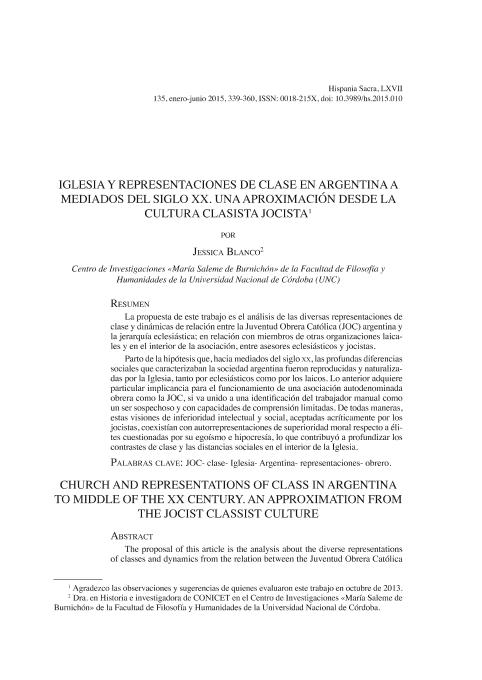Artículo
a propuesta de este trabajo es el análisis de las diversas representaciones de clase y dinámicas de relación entre la Juventud Obrera Católica (JOC) argentina y la jerarquía eclesiástica; en relación con miembros de otras organizaciones laicales y en el interior de la asociación, entre asesores eclesiásticos y jocistas. Parto de la hipótesis que, hacia mediados del siglo xx, las profundas diferencias sociales que caracterizaban la sociedad argentina fueron reproducidas y naturalizadas por la Iglesia, tanto por eclesiásticos como por los laicos. Lo anterior adquiere particular implicancia para el funcionamiento de una asociación autodenominada obrera como la JOC, si va unido a una identificación del trabajador manual como un ser sospechoso y con capacidades de comprensión limitadas. De todas maneras, estas visiones de inferioridad intelectual y social, aceptadas acríticamente por los jocistas, coexistían con autorrepresentaciones de superioridad moral respecto a élites cuestionadas por su egoísmo e hipocresía, lo que contribuyó a profundizar los contrastes de clase y las distancias sociales en el interior de la Iglesia. The proposal of this article is the analysis about the diverse representations of classes and dynamics from the relation between the Juventud Obrera Católica (JOC) Argentinian and the ecclesiastical hierarchy, with members from other laical organizations and inside the association (ecclesiastical advisers and laics). I depart here from the hypothesis that, to the middle of the xx century, the profound social differences that characterized the argentinian society were reproduced and naturalized in the Church, per both, ecclesiasticals and laics. This acquires particular implications for the operation of the one association self-styled laborer as the JOC, if it goes attached to an identification of the manual worker as a suspected being and with limited compression capacities. Anyway, this visions of intellectual and social inferiority, accepted uncritically by the jocists, coexisted with self representations of moral superiority respect to the elites questioned by their selfishness and hypocrisy, what contributed to deepen the contrasts of classes and the social distances inside the Church.
Iglesia y representaciones de clase en Argentina a mediados del siglo XX : una aproximación desde la cultura clasista jocista
Título:
Church and representations of class in Argentina to middle of the XX century. An approximation from the jocist classist culture
Fecha de publicación:
01/2015
Editorial:
Consejo Superior de Investigaciones Cientificas, Instituto de Economia y Geografia Aplicadas
Revista:
Hispania Sacra
ISSN:
1988-4265
Idioma:
Español
Tipo de recurso:
Artículo publicado
Clasificación temática:
Resumen
Palabras clave:
Representaciones
,
Clase
,
Juventud Obrera Católica
,
Argentina
Archivos asociados
Licencia
Identificadores
Colecciones
Articulos(CCT - CORDOBA)
Articulos de CTRO.CIENTIFICO TECNOL.CONICET - CORDOBA
Articulos de CTRO.CIENTIFICO TECNOL.CONICET - CORDOBA
Citación
Blanco, Jessica; Iglesia y representaciones de clase en Argentina a mediados del siglo XX : una aproximación desde la cultura clasista jocista; Consejo Superior de Investigaciones Cientificas, Instituto de Economia y Geografia Aplicadas; Hispania Sacra; 67; 135; 1-2015; 339-360
Compartir
Altmétricas




